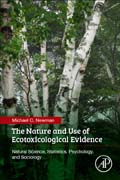
The Nature and Use of Ecotoxicological Evidence: Natural Science, Statistics, Psychology, and Sociology
Newman, Michael C.
The Nature and Use of Ecotoxicological Evidence: Natural Science, Statistics, Psychology, and Sociology carefully examines how toxicologists and environmental professionals come to understand and make decisions about possible harm from pollutants. Misreading evidence by the scientific community, and miscommunication to regulators and the public, remain major impediments to wise action in pollution issues. What evidence comes to dominate the dialogue among scientists, regulators, and decision makers depends on social, as well as scientific, dynamics. Yet psychological and sociological factors that influence the movement of evidence through scientific communities to regulators receive cursory discussion by professionals unfamiliar with the sociology literature. Drawing on concepts and techniques from the natural, social, and mathematical sciences, The Nature and Use of Ecotoxicological Evidence: Natural Science, Statistics, Psychology, and Sociology emphasizes how pollutant-related evidence is gathered, assessed, communicated, and ultimately applied in decision making. Each chapter begins with an open-ended real-world example before fundamental cognitive, social, statistical, or natural science concepts are explored and used to explain the opening example. Methods from other disciplines for recognizing, reducing, or removing the influence of impediments in wise decision making are highlighted at the end of each chapter. Toxicologists, Environmental Scientists, Psychologists, and professionals and students across the sciences will find the materials useful for understanding how evidence is generated, assessed, and communicated in their own fields. Includes groundbreaking research synthesizing information from across the sciences to understand the decision making processProvides real life examples and uses theoretical concepts to analyze them in clear, direct languageEncourages critical thinking about complex problems INDICE: Section 1. INTRODUCTION 1. Human History and the Emerging Importance of Pollution 2. Vital Evidence for the Anthropocene Section 2. HOW INDIVIDUALS GATHER EVIDENCE AND MAKE JUDGMENTS 3. Human Reasoning: Everyday Cognitive Heuristics and Foibles 4. Human Reasoning: Within Scientific Traditions and Rules 5. Pathology of Human Reasoning within the Sciences 6. Individual Scientist: Reasoning by the Numbers Section 3. HOW GROUPS WEIGH AND APPLY EVIDENCE 7. Social Processing of Evidence: Common Dynamics and Foibles 8. How New Evidence Enters and Moves within Groups 9. Evidence in Social Networks 10. Conclusion
- ISBN: 978-0-12-809642-0
- Editorial: Academic Press
- Encuadernacion: Rústica
- Páginas: 250
- Fecha Publicación: 01/01/2018
- Nº Volúmenes: 1
- Idioma: Inglés
